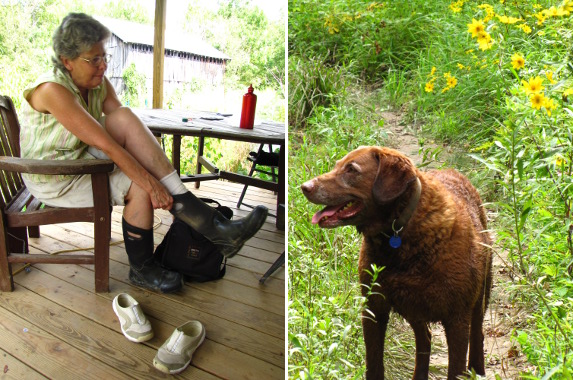
Lost mineral rights

Mark and I went to the
courthouse Thursday to research a property that's one possibility for
the Annex. (One of these days
I'll make a real post about the Annex idea, but our dream is still
evolving and I don't want to tie it down yet.) Our title
search turned up a
disappointing document --- an oil and gas lease from 2003.
Lost mineral rights are
one of the main reasons to perform a title search. As a
landowner, you can sell some of your property rights while still living
on and farming your land, and those lost rights don't come back when
the property is passed on to another owner. In Appalachia,
selling mineral rights is common since many folks are living very close
to the financial edge, so a few thousand dollars now and a few hundred
every year from now on sounds good even if it means your well might be
polluted, your house might cave in, and strangers can tromp across your
land at will.

In our case, it's
possible the lease has expired --- I'm waiting until the holiday
weekend is over to hunt down that data. According to the contract
I read, the gas company needed to either start drilling or start paying
the landowner a certain amount within five years, and there's no sign
of a well on the property, so we might get lucky and not have to deal
with the issue.
But if the mineral
rights are no longer attached to the land, Mark and I will be faced
with a hard decision. This property is within easy walking
distance (unlike
another one we've considered), has lots of road frontage (making it
easy to hold public events there), and is south-facing. There are
also several acres currently being managed as hayfields, so it would be
relatively painless to install our dream orchard and pasture.
Finally, the property is assessed at $600 per acre, which is right up
my skin-flinty alley. (That's exactly what I paid for our current
ugly duckling farm.)

On the con side, the
soil is terrible (which I consider more of an interesting puzzle than a
real disadvantage) and there's no water. And then there's the
potential deal-breaker --- the lost mineral rights. So here's my
question for thoughtful readers --- would you ever consider buying a
piece of land without the mineral rights? If so, how would the
lost rights impact your financial decision?
(As a side note, the photos have nothing to do with this post, as you probably
guessed. Mark and I celebrated Labor Day on Friday by inviting
Mom over and we had a lovely time watching a Barred Owl, picking stick
tight flowers, and hanging out on the porch.)
Want more in-depth information? Browse through our books.
Or explore more posts by date or by subject.
About us: Anna Hess and Mark Hamilton spent over a decade living self-sufficiently in the mountains of Virginia before moving north to start over from scratch in the foothills of Ohio. They've experimented with permaculture, no-till gardening, trailersteading, home-based microbusinesses and much more, writing about their adventures in both blogs and books.
Want to be notified when new comments are posted on this page? Click on the RSS button after you add a comment to subscribe to the comment feed, or simply check the box beside "email replies to me" while writing your comment.

Maggie --- Unfortunately, the oil and gas company has the legal right to do what they want there forever now that the previous owner signed the lease. So, I'd be in the wrong if I tried to fight against them.
(Glad you liked the Mom photos. )
)
Phil --- Fascinating! Although it doesn't seem to be the case where you live, I could see someone retaining mineral rights as a way of preventing mining on land they sell, a bit like putting a conservation easement on a property.
Brandy --- That's where I'm going back and forth. If this land was cheap enough (don't know that yet), then it might be worth it even with rights gone for pasturing and orcharding. We probably wouldn't put as much money into building up infrastructure, though, which would delete the potential social reasons of the annex.
My suspicion was that drilling for oil or gas has possible pollution issues, unless carefully managed. A quick search confirmed it.
Drilling in a karst area seems extra hazardous to me; due to its poreous nature, it would be very easy to accidentally contaminate the groundwater. The state of indiana has special rules for drilling in karst prone areas.
Keeping that in mind, I'd suggest to avoid purchasing land with lost mineral right. If there is a problem, you'll be dealing with the aftermath long after the drilling company has left or gone bankrupt.
In your situation, I would consider the cost of hiring an attorney to explore what the mineral rights in this situation mean and how they would impact your plans.
I live on 5 acres in NM and the family that owned the land I live on retained the mineral rights. In our case it means that should oil or whatever be discovered on our land, we would not be able to profit from it. It did not hinder me in the least from purchasing the property as I do not want drilling in my area anyway. A lease like you describe may be a different subject.
Anna & Mark,
I went thru a similar exercise myself in 2010. I was buying a small lot in rural south San Antonio for a homestead. Did the county record searches myself, since it was a Tax Sale and there were no warranties from the county.
I found out that there were several leases to various companies through the years from 1910's until at least 1960's. All of them expired and the land was subsequently sold in smaller tracts. So my question was: who owns the mineral rights now? The answer: Me.
The reasoning is that the mineral rights always run with the surface rights, UNLESS they are separated(severed) at some point. If an owner decides to lease their rights to a drilling company, it is only for a set period of time, subject to timely payment of the lease or royalties from actual production. The drilling company never owns the rights, the owner does, subject to the terms of the contract for lease. Lease does not equal SALE. Of course, if the owner of the land is the drilling company, then yes, they own the subsurface rights.
What this means is that if the owner of the land you are looking to buy will sell it to you without specifying on the deed that he is retaining mineral rights, then you become the owner of the minerals too. You would become the new lessor too (leases can be transferred). In my case, all the previous deed transactions were Warranty Deeds, and none of them had a severance of minerals clause on it, at least as far back as 1889. If someone shows up with a deed earlier than that and claims they own the rights, it would be a moot point now because there's the concept of adverse possesion, which is kind of like a 'use or lose' law to prevent in part, land grabs. My main motivation was that I did not want to have the possibility of some stuffed suit finding kryptonite or some such in my 2 acres and one morning waking up to machines and drills and smells in my property.
This is how I read those old leases, and it follows logic to me. Plus, this link kinda supports my understanding: http://en.wikipedia.org/wiki/Oil_and_gas_law_in_the_United_States#Prior_to_and_at_extraction Like a car lease, you do not own it until you buy it. The lease is a payment for to acquire the right to use and abuse the car as if it were yours.
So, that land might still be a great deal guys. Do not be put off by a oil lease just yet. Especially if you cannot tell if something's being extracted today, find out who leased the rights to the oil company, and as long as that matches with the name on the Warranty Deed, then it might still be a good deal. The oil company already did the legal work of making sure who owns those rights, so that is some insurance too that you are dealing with the real owner.
Best of luck.
oops. I just realized I wrote a whole treatise on what a lease is, when it is patently clear from your post that you already know what it is. I focused on the title "Lost mineral rights" and did not analize what you wrote.
I will stay away from the 100 degree weather before commenting again.
Roland --- Yep, that's my biggest concern. There are very few environmental regulations in our area, and extraction businesses usually win anyway when taken to court, so it's worth envisioning the worst case scenario.
Tisha --- I'm not sure we really need an attorney --- the contract I read (although very long) was quite clear. We just have to do the legwork to see if it's still in effect. I'd be much happier with a situation like yours since I'd expect the previous owners would be less likely than an oil and gas company to come in and drill!
Pedro --- No need to apologize --- I actually found your "treatise" quite informative, and it's intriguing to see how you searched back through to find out that the leases on your land are no longer in effect.
BeninMA --- There are a couple of different factors tempting us to add an annex. The simplest is that I just don't like to cut down trees, and we'd have to clear land to add any more apples to our homestead. I can work around that if need be --- the younger the forest, the less pain it gives me to cut, and there are some young areas that might make good orchard.
The more important reason to add an annex is that we might like to use it for holding classes open to the public or teaming up with someone without land who wants to homestead. We value our privacy too much to do any of that close to home. But those are also very long-term goals, so we might choose to expand our orchard here at home and wait for the right piece of land to come up for sale.
Unfortunately, I believe holding mineral rights will become more and more rare. It is almost impossible to find land in northern Arkansas that has mineral rights anymore. After years of looking, I didn't see a single parcel that had mineral rights.
The frac'ing that's going on will leave decades or centuries of damage I fear. Clean drinkable water will become more difficult to find in the future in many areas of the country... if the stories coming out of the Ozarks and places like Pennsylvania are to be believed.
Anna - that sentence basically gives them carte blanche to do what they need on the surface of your land to access what is below your land. Reading the lease as if you are the lessor.
What is probably just as important as the terms of the lease is the state property law, get yourself a basic primer on it as to holding, transferring and whether or not that portion of the rights reverts and under what condition etc. I'd be wary of the deal but if you've got warranty deeds on offer with the exception of that lease and that lease is forclosed upon by language/trigger/events stated within the lease itself I'd maybe take the risk...
Best of luck.
Please edit and remove this... but OMG your face looks like you're pregnant. If so, and I don't need to know... But if so congratulations. Otherwise I'll just say "lots of sun and good health"
C, Luckily, it's not our land, just a piece we were looking at. I agree that the lease gives them just about any rights they want. (And I didn't excerpt the whole thing either --- it continues in the same vein.)
I'm a little disturbed to hear I look pregnant in that picture. Luckily, I know it's not the case since we've chosen not to have kids (and Mark made the decision permanent with a vasectomy.)
am not an attorney nor in the oil business.......just some thoughts that might help you
even if the land is not leased, does not mean an oil and gas company cannot lease it from the mineral owner another thing, I may be wrong, but i believe at least 35 states have forced pooling, so even if the mineral owner does not want to lease, under certain circumstances the minerals, whether held by you or someone else can be forced pool. what does forced pooling mean regarding the surface rigts and access to them.....can they drive across your property? actually drill on it? how close can they get to your home? do horizontally drilling underneath? might want to make an appointment with your state representative or state senator in the hopes of being put in contact with someone in your state who can tell you.....in Oklahoma, it would probably be someone in the Oklahoma Corporation Commission.....finally, always remember that the law can change.......BELIEVE you have to be as educated as possible upon what is going on in the area in which you want to buy, is there drilling, is land leased in the area, leasing going on, anyone know if there is potential in the area for production?? hope you have already found a special place
Mineral rights are recorded against the deed at the register of deeds. If they are not recorded there, you do not have any. Nice try. If you really spent thousands of dollars on lawyers and years of research and failed to learn this, you are a uniquely disabled person and should qualify for government assistance.